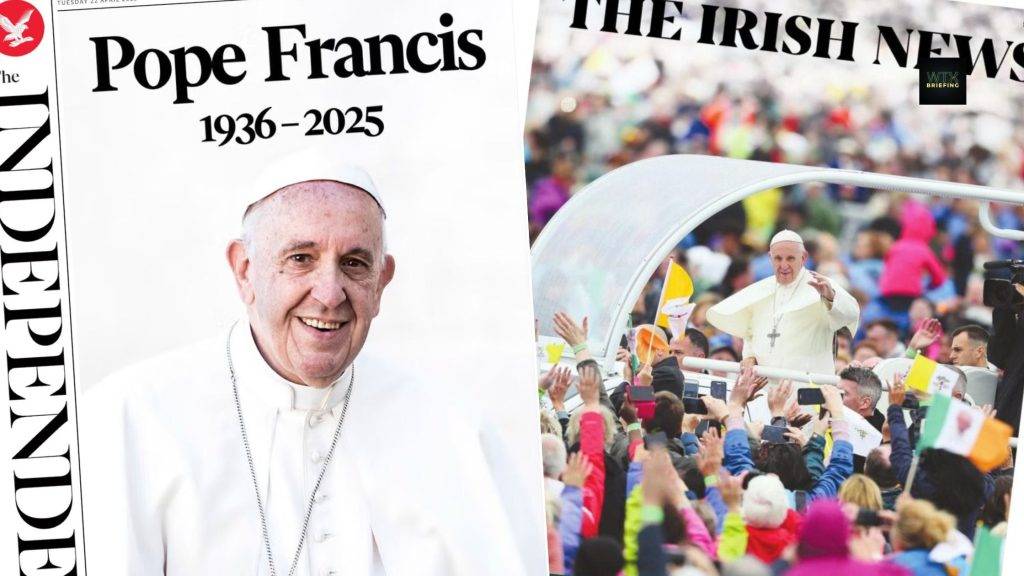The death of Pope Francis leads almost all the UK newspaper front pages this morning with heavy coverage in England, Scotland and Northern Ireland – the Welsh reserve much of their coverage for online. The papers dub Pope Francis the People’s Pope in this mornings headlines and describe him as ‘groundbreaking,’ ‘modern’ and someone ‘championing the poor.’
Much of the coverage highlight’s the Pope’s efforts at making the Catholic Church more inclusive and modern. Some papers report on how the pope was seen as a divisive figure for predominantly Republican Americans – who wanted the Catholic Church to remain traditional, the Americans took issue with the Pope’s call for politicians to be kinder to immigrants and a softer, more kinder approach to LGBTQ and trans people.
The Vatican confirmed the Pope died on Easter Monday at the age of 88 due to a cerebral stroke that resulted in a coma and subsequent heart failure. The pontiff had recently been struggling with his health after battling double pneumonia.
Pope Francis the People’s Pope
In a nod to the famous saying, The People’s Princess (a nickname for Britain’s Princess Diana after her death in 1997) its no suprise the UK newspapers have dubbed the pontiff ‘The People’s Pope’ highlighting his mission to modernise the Catholic Church and become more inclusive.




He fought all his life for the poor & the forgotten. He was the People’s Pope
Explainer: This headline uses emotionally charged language and a strongly positive bias to portray the Pope as a heroic, compassionate figure. By referring to him as “the People’s Pope” and highlighting his fight for “the poor & the forgotten,” it simplifies his complex legacy into a sentimental narrative. This tactic, common in obituary journalism, leans into idealisation and emotional appeal rather than balanced reporting, framing his life in a mythic, almost saintly light.
- The Daily Mirror reports that his “humility and his advocacy for those living in poverty” endeared him to the masses.
He’s returned to the house of the Father
Explainer: This headline uses religious and poetic language to convey the Pope’s death in a comforting, spiritual light. The phrase “returned to the house of the Father” reflects Christian belief in the afterlife, framing his passing as a peaceful homecoming rather than a loss. It avoids direct mention of death, softening the news and appealing to the faith and emotions of the audience, a common tactic in religious or faith-based reporting.
- The Daily Mail describes the Pope’s death as a “pivitol moment” with a battle to shape the future directio of the Catholic Church now beginning. The paper says after his final blessing on Easter Sunday, the frail Pope died of a stroke and now a battle for the Catholic Church’s future begins.
A modernising pontiff in an era of populism and polarisation
Explainer: This headline adopts a more analytical and neutral tone, positioning the Pope as a reformer by calling him a “modernising pontiff.” It subtly highlights his significance by placing him within the broader context of “an era of populism and polarisation,” suggesting he was a stabilising or progressive figure during turbulent times. While less emotionally charged, it still frames his legacy in a favourable light through contrast with global division.
- The FT reports that the first non-European pontiff in centuries pioneered change but was not the radical liberal of conservative imaginings.
One last Easter blessing and his work was done
Explainer: This headline uses poetic and symbolic language to create a poignant narrative around the Pope’s final moments. The phrase “one last Easter blessing” ties his death to a deeply significant religious event, while “his work was done” evokes a sense of fulfilment and divine purpose. It sentimentalises his passing, suggesting a peaceful, meaningful end, and reinforces a sense of spiritual closure rather than focusing on the factual aspect of his death.
- The Daily Telegraph’s headline is reference to the Pope taking part in Easter services less than 24 hours before his death.
He touched the lives of so many
Explainer: This headline uses vague yet emotive language to create a warm, universally positive image of the Pope. The phrase “he touched the lives of so many” suggests deep personal impact without offering specifics, allowing readers to project their own feelings or memories. It relies on emotional appeal and general admiration, a common journalistic tactic in tribute coverage, to emphasise legacy over detail.
- The Daily Express focuses on British reaction with tributes from the King and Queen and an appreciation by the Archbishop of York, Stephen Cottrell. He says Pope Francis’s legacy will continue to shape the world for years to come.
World mourns death of the ‘People’s Pope‘
Explainer: This headline combines global scale with emotional resonance, using the phrase “World mourns” to suggest widespread grief and significance. Referring to him as the “‘People’s Pope’” reinforces a positive, populist image, framing him as deeply beloved and accessible. It uses collective language and a strong emotional tone to elevate his status and legacy, a typical tactic in tribute journalism to unite audiences in shared mourning.
- The Scotsman says Pope Francis was hailed for his ‘mercy and compassion’.


